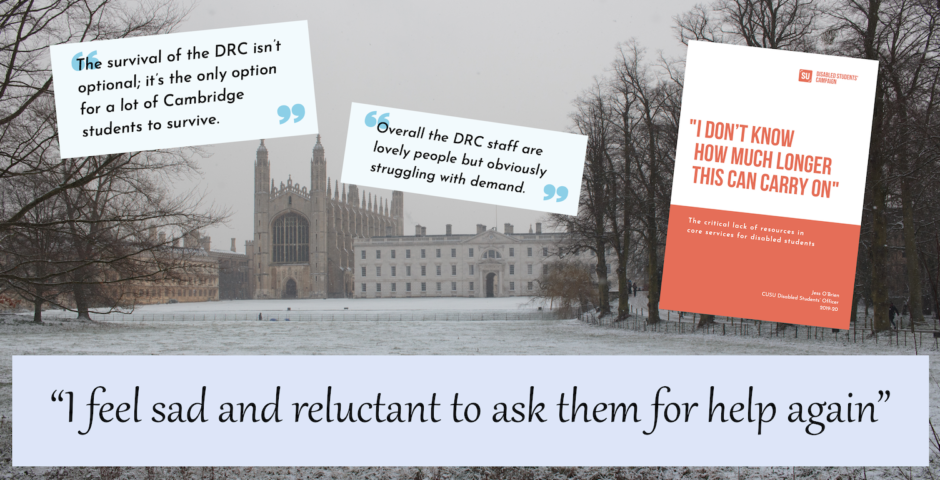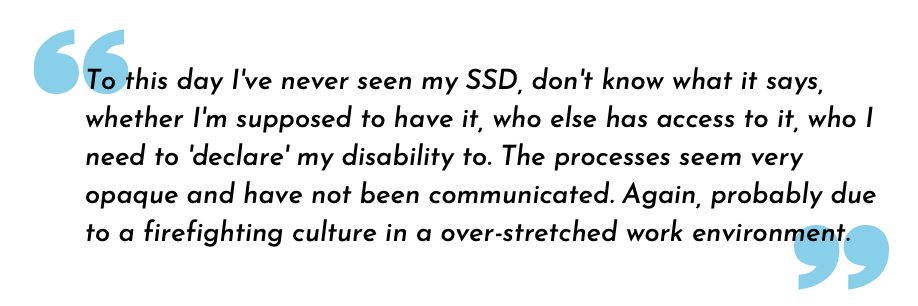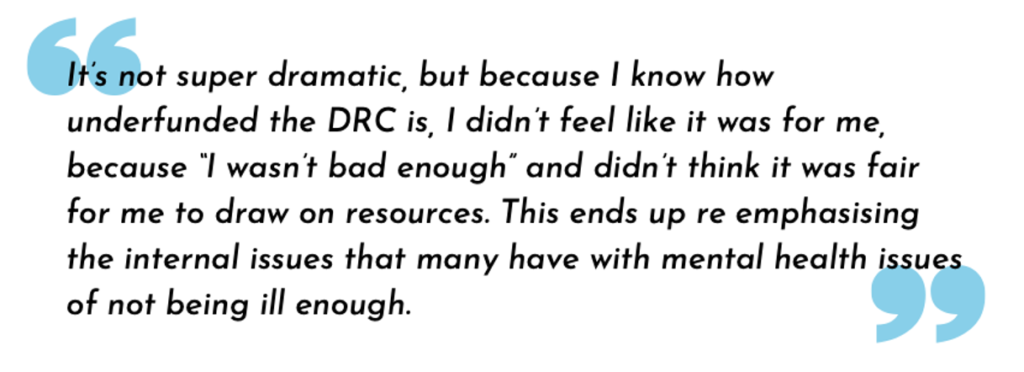
We spoke to students affected by service delays at the Disability Resource Centre
Underfunding of the DRC is allegedly forcing students to wait months for adequate disability provisions
A Cambridge Students’ Union report has claimed that under-funding of the Disability Resource Centre (DRC) is compromising student care. The 2019/20 Disabled Students’ Officer, Jess O’Brien, reported receiving messages from students about slow response times and long waiting times for appointments at the DRC.
The Tab Cambridge spoke to disabled students about waiting times at the DRC and the impact that the delays have had on their wellbeing and academic studies. Here are some of their testimonies:
‘If I had received the support I needed sooner, a lot of the difficulties I had could have been lessened or avoided’

Students reported that long waiting times at the DRC left them on the verge of intermitting (Photo credits: Cambridge SU report)
Lauren, a postgraduate student at King’s, contacted the DRC before Michaelmas term of her third year to get an initial assessment for autism spectrum disorder. She received an appointment in late November – several months after her initial email.
In the appointment, she was informed of the available support, including mentoring and the creation of a Student Support Document (SSD). Lauren did not receive any of this support until Lent term by which time her health and academic situations had deteriorated to the point that she had to intermit.
Lauren said: “Whilst I do not explicitly or fully blame the DRC waiting times for my intermission, I do believe that if I had received the support I needed sooner, a lot of the difficulties I had could have been lessened or avoided.”
‘I feel sad, and reluctant to ask them for help again’

Students reported particular problems with SSDs, with some not knowing about the contents of their SSD or who it had been circulated to (Photo credits: Cambridge SU report)
A student, speaking to The Tab Cambridge anonymously, says that it took four months for their SSD to be sent to their supervisors and course coordinator.
The same student says that the DRC never responded to their email about organising accessible accommodation at their college.
The student said: “Rationally I now know these [problems] were caused by DRC advisers being overworked, but at the time, it felt like they just didn’t care. I feel like with either of these issues, had I not been someone who felt able to speak out, I would have really struggled.
“Thinking about my experience with the DRC, I feel sad, and reluctant to ask them for help again.”
Amy, a second year undergraduate, was on the DRC’s list of students at the start of her first year. She had previously disclosed that she had a long-term mental health condition through UCAS. Uncertainty around whether this “counted” as a disability made her reluctant to actively seek support. She did not have an appointment with the DRC until Easter term of that year.
While the meeting was positive, Amy never received a follow-up email from her advisor. She was left unsure as to whether an SSD had been drafted and circulated to the relevant members of staff. She was unable to continue contacting the DRC, owing to a severe deterioration in her mental health. This prevented her from accessing any support.
Amy’s difficulties continued into her second year and resulted in intermission. It has only been at the end of this term – two years after her arrival in Cambridge – that she accessed the necessary support.
‘I thought I was just going to end up going backwards and forwards between the DRC and the nurse’

Students reported not using the DRC due to concerns over whether their disability was “bad enough” (Photo credits: Cambridge SU report)
A student, speaking to The Tab Cambridge anonymously, says that they had to wait two months for a DRC appointment to approve exam arrangements.
At the meeting, the advisor incorrectly told them that they only needed a note from the college nurse. The college nurse subsequently told them this was incorrect and emailed the DRC to rectify the problem. The student says: “There was definitely a point where I thought I was just going to end up going backwards and forwards between the DRC and the nurse and never actually get anything.”
According to the Cambridge SU report, “the only solution is to increase funding for the DRC, and this is long overdue”. To achieve the level of support for disabled students recommended by the HEFCE, the DRC should have 16 full-time advisors. The 2018-19 DRC suggests they have the equivalent of 4.42 full-time roles.
The SU Disabled Students Officer, Rensa Gaunt, commented: “The results of this report are no surprise to disabled students, as they describe years’ worth of under-resourcing. The University is failing in its legal duty to provide disabled students with access in anticipation of them needing it, not months, years or several intermissions later.
“The university have known about the findings of this report for many months now and I am appalled that no urgent action is being taken.”
The university has since responded to the SU’s claims. A university spokesperson said: “The DRC has added two new posts in the last 12 months, recruited for and filled these new posts. Despite the impact on the capacity of the service from current government Covid-19 restrictions and associated staff absences, the DRC has delivered 35% more non-medical help (such as mentoring and study skills) to disabled students than in the same period in the previous year.
“The DRC continues to work hard to ensure students are able to access support.”
Featured image credit: Rebecca Heath
Related stories recommended by this author:
• Disability Resource Centre ‘at breaking point’ according to Cambridge SU report
• Cambridge University Labour Club open letter calls for changes to mental health returns policy
• It’s time to stop pretending access problems disappear when students arrive at Cambridge









































